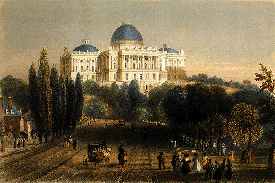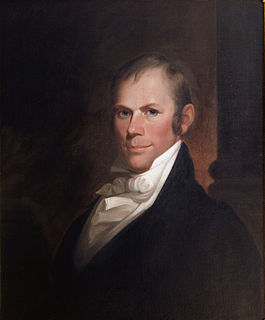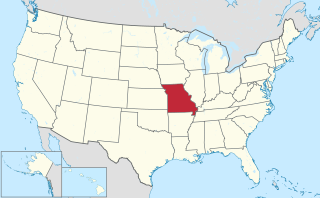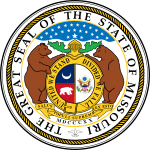
The 1820 United States presidential election was the ninth quadrennial presidential election. It was held from Wednesday, November 1, to Wednesday, December 6, 1820. Taking place at the height of the Era of Good Feelings, the election saw incumbent Democratic-Republican President James Monroe win re-election without a major opponent. It was the third and last United States presidential election in which a presidential candidate ran effectively unopposed. It was also the last election of a president from the revolutionary generation.

The 16th United States Congress was a meeting of the legislative branch of the United States federal government, consisting of the United States Senate and the United States House of Representatives. It met in Washington, D.C. from March 4, 1819, to March 4, 1821, during the third and fourth years of James Monroe's presidency. The apportionment of seats in the House of Representatives was based on the Third Census of the United States in 1810. Both chambers had a Democratic-Republican majority.

The 17th United States Congress was a meeting of the legislative branch of the United States federal government, consisting of the United States Senate and the United States House of Representatives. While its term was officially March 4, 1821, to March 4, 1823, during the fifth and sixth years of James Monroe's presidency, its first session began on December 3, 1821, ending on May 8, 1822, and its second session began on December 2, 1822, to March 3, 1823. The apportionment of seats in the House of Representatives was based on the third Census of the United States in 1810. Both chambers had a Democratic-Republican majority.

Elections to the United States House of Representatives for the 18th Congress were held at various dates in different states between July 1822 and August 1823 during President James Monroe's second term.

Elections to the United States House of Representatives for the 17th Congress were held at various dates in different states between July 1820 and August 1821 as President James Monroe won reelection unopposed.
Mark Langdon Hill was United States Representative from Massachusetts and from Maine. He was born in Biddeford on June 30, 1772. He attended the public schools, then became a merchant and shipbuilder in Phippsburg. He was an overseer and trustee of Bowdoin College. He is the nephew of John Langdon. New Hampshire governor, Senator and patriot.

Ezekiel Whitman was a Representative from Maine, both when it was the District of Maine within Massachusetts and after it became an independent state. He was born in East Bridgewater in the Province of Massachusetts Bay on March 9, 1776. He graduated from Brown University in 1795. He studied law, was admitted to the bar and practiced in New Gloucester, Maine and in Portland, Maine.
Peter Sharpe was an American politician who served as a United States Representative from New York.

The 1820 United States presidential election in Missouri took place between November 1 to December 6, 1820. The state’s electors were pledged to the eventual winner, James Monroe, by the state legislature. It was the first year Missouri cast ballots for the electoral college.

The tables below list the United States presidential elections in Missouri, ordered by year. Since 1904, Missouri has voted for the eventual winner of the presidential election with only four exceptions: 1956, 2008, 2012, and 2020. Missouri was historically viewed as a bellwether state, but the consecutive errors in 2008 and 2012 introduced doubts about its continued status as a bellwether, and an 18.04 point Republican victory in 2016 indicated that it had become a safe Republican state.
The United States Senate elections of 1820 and 1821 were elections for the United States Senate that, corresponding with James Monroe's landslide re-election, had the Democratic-Republican Party gain one-to-five seats, assuming almost complete control of the Senate.

Kentucky elected its members August 7, 1820.

Maryland elected its members October 2, 1820.

The 1820-1821 United States Senate election in Pennsylvania was held on three separate dates from December 1820 to December 1821. On December 10, 1821, William Findlay was elected by the Pennsylvania General Assembly to the United States Senate.

On December 20, 1820, Jesse Slocumb (DR) of North Carolina's 4th district died. A special election was held to fill the resulting vacancy

On August 9, 1820, William Woodbridge, the first delegate for Michigan Territory, resigned, after having served since March 2, 1820. A special election was held to fill the resulting vacancy.

The 1820 United States elections elected the members of the 17th United States Congress. The election took place during Era of Good Feelings and the First Party System. Despite the Panic of 1819, the Democratic-Republican Party maintained control of the presidency and both houses of Congress, while the Federalist Party provided only limited opposition. Missouri joined the union during the 17th Congress.

This was the first election in Maine since its separation from Massachusetts. In the previous election, Massachusetts had had 20 representatives. Seven seats were reassigned from Massachusetts to Maine. In addition, under the terms of the law which admitted Maine to the union, any vacancies in the 16th Congress by Representatives elected to represent Massachusetts but residing in the new states of Maine would be filled by a resident of Maine. John Holmes, who had been elected to the House for the former 14th district of Massachusetts was elected as one of the first two senators for Maine. The vacancy was filled in a special election by Joseph Dane (Federalist). Dane was the only Representative officially considered as representing Maine in the 16th Congress. The Representatives from the 15th-20th districts were still classified as being from Massachusetts for the remainder of the 16th Congress.

North Carolina elected its members August 9, 1821, after the term began but before the new Congress convened.













